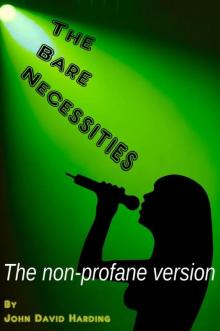- Home
- John Harding
Florence and Giles Page 11
Florence and Giles Read online
Page 11
Now it trued that Captain Hadleigh was by no means my friend. I well remembered our first interview, when he sat behind his desk with his fingers steepled before his face, the tips pressed to his nose, and listened to what he referred to as my ‘version of events’.
I told him what I had already told the police officer who had questioned me immediately after the ‘event’, pausing frequently in my story to dab my eyes with my handkerchief, for I could not unflow my tears, or to draw a deep breath before plunging in on the next bit. He listened uncommenting to the whole thing and then sat for a moment in silence, his eyes peering at me from above his fingertips as though I were a dead animal or a bird that he was about to dissect.
‘Did Miss Whitaker fall straight into the water?’ he asked at last.
‘Why, yes, leastways, I think so.’ I paused a moment, trying to remember. ‘Yes, I’m pretty sure she did. Like I said, she got up to take the oars from me and the boat kind of rocked and then she stumbled and I think maybe tripped upon the hem of her gown and over the side she went.’
He sat and thought some more. ‘And that’s all that happened?’
‘Yes sir. Far as I remember. Of course, it all happened so fast.’
‘And you say she went straight into the water?’
‘Yes sir, straight in.’
‘She didn’t hit her head on the side of the boat as she went over?’
It was again my turn to think. I screwed up my eyes trying to picture the scene, but got only a blank. But although I saw nothing I did seem to recall a sound. ‘Well, sir, now that you mention it, there was kind of a loud crack before the splash. The sort of noise a human head might make against wood, if you know what I mean.’
‘No, young lady, I don’t know what you mean. I have never heard the sound of wood on bone.’
We sat there silencing another age or two. I twisted my sodden handkerchief around my fingers. He stared at me some more. I uncomfortabled but I wasn’t about to be shaken by some young whippersnapper like him, so I carried on staring right back.
‘She could have hit her head on the side, that could have been the sound. I don’t rightly remember. Like I said, it was all so fast.’
‘Very well,’ he said. He peered at me over his fingertips again, as if they were a gunsight and I the hapless prey. ‘And when she went into the water, did you not try to rescue her?’
‘Why yes, sir. Leastways, I wanted to but her falling seemed to make the boat skid away from her. I was much too far off to reach her.’
‘Come now, it takes some time for a person to drown. You could have rowed the boat back to her.’
‘Oh, no sir, I hadn’t the oars. As I have told you, Miss Whitaker was in the act of taking them from me when she overbalanced and went into the water. The oars went with her, sir, and were as out of reach as she was.’
He said nothing.
‘The oars were found floating on the lake afterward, if you remember, sir. I did try paddling the boat to her, with my hands, but I was then something like twenty feet away from her, the boat had so drifted. The problem I had was the boat was too wide for me to get both hands in the water at the same time, sir, and paddling with one hand at a time just made it turn a circle, sir.’
He nodded at this, recognising it as a detail that only one who had tried it could describe. ‘Very well, that’s all for now,’ he said at last. ‘You may go.’
I was near out the door when his voice caught up with me and hauled me back. ‘Oh, just one more thing.’
I turned. ‘Yes…?’
‘That noise, that head on wood noise, or should we say wood on head? Couldn’t have been an oar, by any chance?’
I stared him out again, aware of the blood draining from my face.
‘That I couldn’t tell you, sir,’ I said, ‘for it’s a sound I have never heard.’
We had two or three more encounters after that and it every-timed the same, he’d hark back to the business of the sound and again-and-again me about the oars, but I had nothing to add. I felt he unsatistfied the whole thing in some way but put that down to the man’s nature and the exigencies of his job. In the coroner’s court I would often catch him looking at me as if I were some puzzle he couldn’t quite figure, an object of fascination to him. I had plenty more of the same questions from the coroner, who was a kindly old man who told me to sit down when I gave my evidence and made his clerk fetch me a glass of water. Answering him and upglancing and seeing Hadleigh with his eyes upon me then, I couldn’t help wondering if this had been all along the point of his interrogations, to rehearse me for when the proper questions came. I felt that if we had met under different circumstances, a ball perhaps – not that I had ever been to one – or on a skating rink, Hadleigh would have liked me, but because of the Whitaker affair, I confounded him quite.
So why now did I think Hadleigh would want to help me? Why would he believe my story, even suppose I could get to tell it to him? It was a big thing to expect a grown man, a sceptical police officer, to swallow – more like a fairy tale than a proper mystery – that my brother and I had a wicked governess who was plotting to steal him. Moreover, that she might not be human, but some manifestation from another world, even our previous and now dead governess, scorning the next world for this.
Then again, for all that he had not friendlied me, but continued to examine me with those sharp blue eyes of his, Hadleigh had proved my saviour in all the business of Miss Whitaker’s brother, specially in that awful scene in the courtroom when the man stood up and shouted, such terrible things that I had to cover my ears, that it was all a whitewash, that his sister’s death had not been properly investigated, that her employer was to blame for letting her on the lake with no one but a child to save her, that there was ‘something fishy about the whole thing’.
I felt near to have died from the shame of it all, with everyone’s eyes feeding off me, like crows on a dead rabbit, but it seemed no sooner had the disturbance started than Hadleigh and his men were upon Whitaker and had his arms pinned behind his back and him marched out of the room and not let back in again for the rest of the proceedings. It was the same when I outed the courthouse and again when I returned next day. Whitaker lay in wait for me but just as we pulled up in the horse and trap Hadleigh had his men upon him and him whisked away and no more harm done. I suspicion that he scared the man off too, for I never eyeclapped him again.
So the situation with Hadleigh was like a finely tuned balance, with not much required to tip it one way or the other. On the one hand, he had knight-in-armoured me, saving me pain and humiliation at the hands, or rather from the mouth, of Miss Whitaker’s brother. On the other, he looked at me as if I were his special study, an enigma only he could solve, and his protection of me from Whitaker no more friendly to me than that. Still, I nothing-elsed, I had no other to turn to. It was Hadleigh or no one.
Deciding that I had nothing to lose by seeking his help was not the same, though, as getting it. The police station was in our little town. It was eleven miles away and I had no way of getting there except for carriaging by John. But I could not just say, ‘I want to go into town,’ it would not be allowed by Miss Taylor, indeed had never been allowed before she came, even by Mrs Grouse. Giles and I hardly evered to town, for all our needs were met at Blithe, where we were fed and watered and measured for our clothes and doctored when we illed.
This last made me think. We were doctored but we were not dentisted. Once, when I was smaller and had an aching baby tooth, they took me into town to see Mr Field, the dentist, an ornery old man who evidently hated his job and even more so when it involved children. Now it obvioused me that a dentist could not call upon me at Blithe, for he would need his equipment, the heavy leather and brass chair, which he could pump up with a pedal to bring you to his height, and the looming flamingo threat of his drill, which I had never seen in action but only heard from the waiting room, although that was enough to shiver me quite.
I thought at first o
f complaining of toothache so I would have to be taken to Mr Field, but that would not do, for if Miss Taylor came too, as well she might, then it would not opportunity me to visit the police station to see the captain. Only one solution suggested itself to me. Giles would have to be the one who visited the dentist. I would accompany him and, when the moment opportunitied, slip away to the police station.
It was a couple of days before I aloned with Giles, long enough to put my plan to him. His reaction was no more than I expected. ‘The dentist? Ask to see the dentist? No fear! I’m not being drilled and filled or having my teeth pulled out one by one. The Spanish Inquisition used that as a form of torture, you know.’
‘But, Giles, you wouldn’t have to have your teeth drilled or taken out. There’s nothing wrong with them.’
Giles inserted a finger into his mouth and ran it over his teeth, checking. ‘How can you be so sure? What if I get there and old Field spots something and gets that drill of his going?’
‘But he won’t, Giles, because there’s nothing wrong with your teeth.’
‘Oh, yes, so you’re a dentist now, are you? And anyway, what if he says there’s something wrong with one of ’em even though there’s not, just so as he can pull it out and collect a fat fee?’
‘He wouldn’t do that. It’s not allowed. It’s…it’s…it’s against the Hippocratic oath.’ I uncertained the truth of this, but when I explained what the oath was to Giles he didn’t question it, which just goes to show that if pulling out good teeth isn’t against it then it should be.
Giles suspicioned me one, weighing up his options. ‘You’re sure he won’t do anything to me?’
‘Cross my heart and hope to die.’
‘Well, OK then, I’ll do it. When do you want me to go down with the toothache?’
‘Tomorrow morning would be good. We don’t want to leave it too late in the day to get to Mr Field.’
At this point Miss Taylor reappeared and Giles started to back to his books.
‘Oh, and Giles,’ I hissed after him.
He turned and whispered, ‘What?’
‘Don’t overact.’
Well, I might have saved my breath on this last because it seemed to serve only as an encouragement to Giles, who threw himself into the part of a boy with raging toothache with an enthusiasm so great as to put our whole scheme in jeopardy. We had three-quartersed through breakfast and I alarmed that he had either forgotten our plan or changed his mind, so I sharped him a kick on the shin under the table.
‘Ow!’ he let out. Miss Taylor suspicioned him one and then me, but said nothing and went back to buttering a piece of bread with the same intense concentration with which, I’d noticed, she’d been buttering it ever since we sat down to eat.
‘Toothache!’ I mouthed at Giles. ‘Do it now.’
‘No,’ he mimed back and indicated the pile of bread and marmalade on his plate. ‘I haven’t finished yet.’
I exasperated a sigh, shot him a meaningful one and when he stubborned me one back, decided to take matters into my own hands, or rather feet, and sharped him another one on the shin.
‘Ow!’ It was much louder this time and could not be ignored.
‘Why, Giles,’ said Miss Taylor, finally giving her butter knife a rest and laying it and the bread down on her plate, ‘I thought I heard you cry out before. Whatever is it?’
Giles glanced at me but I blacklooked him back and luckily he caught on that this was the perfect cue to go into his act. ‘It’s my teeth, Miss Taylor, one of ’em’s aching real bad. Ow! Ow! Ow!’
She got up from her seat and straightwayed to him. Her arm snaked around him and she hugged him to her. ‘There, there, don’t take on so, my dear.’
‘Oh, but Miss Taylor, it aches something terrible,’ said Giles, breaking free of her with a push. He leapt from his chair. ‘Oh, God in heaven, I think I’m going to die!’ At this he collapsed to the floor and commenced wriggling around, as a mouse does if you skewer it with an ice pick, except that Giles held a hand to his forehead in that way you see actors do in photographs of them practising their craft.
Miss Taylor knelt beside him and stroked him to calm him. ‘Hush Giles, hush, you must show me which one is hurting.’
Giles was prevailed upon to sit up while she cradled him with an arm. He stuck a finger in the side of his mouth. ‘Gis gun heayah.’
Our new governess peered into his mouth. ‘I don’t see anything wrong with it.’
Giles shifted his finger. ‘Or gaybe gis gun, I just gon’t know. It’s goo gard oo gell.’
Miss Taylor got him to his feet and helped him into the drawing room, where she laid him out on a couch, it apparenting now to all that the toothache had rendered Giles incapable of standing. The noise had attracted pretty much the whole household. Mrs Grouse fetched laudanum and I watched, heart overbeating, as she administered a few drops to my brother, fearing that if it drowsied him he might forget himself and give away our plan, which was so far working perfectly as John went out to ready the horse and trap.
It was at this point, though, that my scheme began to awry. ‘I’ll be but a moment, Giles,’ said Miss Taylor. ‘I just need to fetch my coat and hat, and your own coat, of course.’
‘But I –’ I began. I had been hoping that Mrs Grouse and I would take Giles into town, as we had always done in the past. I knew that if Miss Taylor accompanied us it would be so much the harder for me to slip away. Now she seemed to be suggesting an even worse situation, namely that she would alone with Giles to town and I would be left behind. I panicked some, for what if I had just handed her the opportunity she wanted, to steal Giles away from Blithe and never return?
‘But what?’ Miss Taylor rounded on me, snaking me with her eyes.
‘I thought I would go with Giles.’
‘That will not be necessary,’ she hissed before turning on her heel and leaving the room.
I deflated. The laudanum had not quieted Giles’s pain at all; why would it, his agony being entirely theatrical? He now slid from the couch and lay on his back on the drawing-room rug kicking his legs and pounding his arms and screaming at the top of his voice. Mrs Grouse helplessed me a shrug. I knelt beside my brother and began to wipe his brow.
‘Shh, Giles,’ I alouded, then whispered under my breath, ‘Giles, you must demand they take me.’
‘Oh, sweet Jesus let me die! Please let me die!’ he screamed, and then sottovoceed, ‘Why, Flo, if Miss Taylor’s coming, what need have I of you?’
I surreptioused a sharp tug of his hair, causing him to cry out with real feeling this time. ‘You stupid little boy,’ I hissed. ‘That’s the whole point, don’t you remember, so I can get to town!’
‘Oh yes,’ he whispered back, as Miss Taylor returned to the room, coat on, hat in hand, with Mary in her wake holding Giles’s coat. ‘FLO!’ he screamed. ‘I WANT FLO!’
Miss Taylor pushed me aside and took my place. ‘It’s all right, Giles, I shall be with you. There’s no need to trouble Florence.’
‘It’s no trouble,’ I said starkly.
Giles began his kicking and pounding again. ‘I WANT FLO! I WON’T GO WITHOUT HER! I CAN’T GO WITHOUT HER!’
‘Oh, very well,’ said Miss Taylor.
‘I’ll get my coat and hat,’ I said and dashed from the room, still fearful they would set off without me if I did not haste.
18
It was a strange party we made, carriaging toward town. John, usually unflappable, telling the horse to gee up and giving him some whip, which he never normally did; Miss Taylor, maintaining a frosty silence, still annoyed by my presence, or if not exactly by that, then that Giles’s need seemed to be first and foremost for me, which of course would not at all suit her plans; and Giles moaning and whimpering like a stuck pig. Indeed, he so relentlessed the manifestations of his agony that I caught myself thinking that maybe, by some strange coincidence, he really did have toothache and that it was no longer an act. The boy had a talent for melodrama, I’
ll give him that, gasping out solemn imprecations that if he should die we should not mourn him but remember him only as he had been one summer’s day in the garden a couple of years back, a day that seemed so very special to him, that the fact I had no recollection of it any more than any other day regretted me quite. Giles so tragicked I was quite sure he had forgot the whole thing was an act, which difficulted me in the extreme not to laugh out loud.
So spurred on by Giles’s noises was John that we galloped into town. One thing struck me as strange as we entered the beginnings of Main Street, that Miss Taylor lowered her veil. Why should she do that, I wondered, why should she not want her face to be seen? Of course, Miss Whitaker had oftened to town, once-a-weeking there, and it wondered me now that if Miss Taylor were indeed one and the same as our first governess, whether there were not someone here whom she feared might recognise her, as though perhaps that hint of familiarity I had found in her expression might even more apparent to others. I had no time to dwell on the thought because we roared to a halt outside Mr Field’s surgery and, after tying up the horse, John carried Giles inside, so maintaining the idea that the inflammation had spread from his mouth down to his legs and unabled him to walk.
Mr Field’s timid little wife, who acted as his desk clerk and nurse, bade us be seated in his waiting room, a dingy collection of armchairs covered in scuffed red velvet (so as not to show the blood, Giles had insisted when we came before) that smelt of a potent brew of tobacco and chemicals and had the immediate effect of making me want to be sick. ‘He won’t keep you a moment,’ said Mrs Field. ‘He has a complicated piece of drill work to perform upon another patient and he is right in the middle of it.’ In confirmation the whine of a drill started up, at which Giles immediately quieted, then began noising again but this time not in the tune of agony but in fear.

 Florence and Giles
Florence and Giles One Big Damn Puzzler
One Big Damn Puzzler The Girl Who Couldn't Read
The Girl Who Couldn't Read The Bare Necessities (Non-Profane Edition)
The Bare Necessities (Non-Profane Edition)